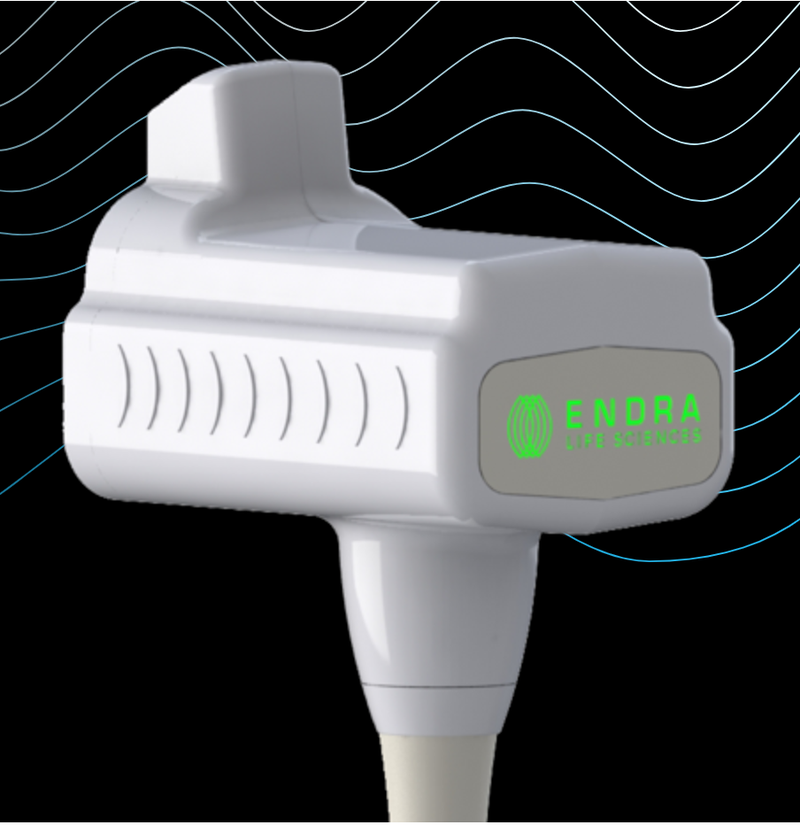ENDRA Life Sciences to Pursue De Novo Pathway for TAEUS System
 ENDRA Life Sciences Inc. will build on the content of its completed 510(k) application and pursue the De Novo pathway for its TAEUS System (Thermo Acoustic Enhanced UltraSound). The TAEUS system is intended to characterize fatty liver tissue as a means to non-invasively assess and monitor Non-Alcoholic Fatty Liver Disease (NAFLD).
ENDRA Life Sciences Inc. will build on the content of its completed 510(k) application and pursue the De Novo pathway for its TAEUS System (Thermo Acoustic Enhanced UltraSound). The TAEUS system is intended to characterize fatty liver tissue as a means to non-invasively assess and monitor Non-Alcoholic Fatty Liver Disease (NAFLD).
ENDRA’s updated regulatory strategy is the result of a tremendous amount of productive dialogue with the US FDA, which led to a clearer understanding of the path forward to achieve ENDRA’s US market claims for the TAEUS System. While ENDRA could continue to pursue its 510(k) application, ENDRA now believes that the potential resulting 510(k) market claims may understate the TAEUS System's clinical and commercial value. This is particularly so when ENDRA considers the remaining effort to demonstrate 510(k) predicate equivalency compared with the effort involved in the De Novo pathway. For a similar investment of time and effort, ENDRA believes it can achieve a stronger market position through the De Novo process with TAEUS-optimized market claims compared with the 510(k) approach.
Unlike a 510(k) clearance in which FDA determines “substantial equivalence” between a new product and another commercially available product with the same intended use and safety and efficacy profile (e.g., Ultrasonic imaging systems), the De Novo process provides a pathway for ENDRA to set the bar for an entirely new product classification. Further, this regulatory path will showcase TAEUS’ distinctive capabilities and will highlight TAEUS as being unique and novel, thereby strengthening TAEUS’ competitive position when it becomes available for sale in the US.
ENDRA’s De Novo submission will include leveraging substantial portions of ENDRA’s completed 510(k) submission, which encompasses many of the same elements as the intended De Novo submission, including safety and efficacy data. The company will also customize TAEUS’ proprietary testing methods into “special controls,” which will become requirements for future product submissions. This is expected to accelerate 510(k) submissions of future generations of TAEUS products while creating market-entry barriers for competitive products. Also, ENDRA will add limited confirmatory clinical data from a subset of ENDRA’s existing clinical evaluation sites, which is expected to be available in 2022.
"We are very encouraged with FDA’s feedback on our TAEUS System’s safety and performance data as well as their support of a De Novo pathway, which is well-suited to TAEUS’ low-to-moderate risk profile and ENDRA’s desired market claims for our novel technology. ENDRA believes it is now aligned with the FDA on the scope of the limited confirmatory clinical data, which is the primary remaining element needed for a De Novo submission. We are confident that a De Novo request is the strongest path to bring our TAEUS technology to the U.S. market. We believe this process should yield sustainable commercial advantages for our TAEUS platform by establishing a differentiated indication for use and setting the bar for an entirely new class of products,” stated ENDRA's Chief Executive Officer Francois Michelon.
The De Novo process provides a pathway for medical devices of low-to-moderate risk that do not have a marketed predicate device. The Company plans to voluntarily withdraw its 510(k) application, which is currently in review with the FDA, and subsequently submit a De Novo application. ENDRA intends to leverage clinical data from a subset of its existing global clinical study partnerships to support the De Novo request. Each clinical site will be screening patients with MRI-PDFF (magnetic resonance imaging proton density fat fraction) as well as with TAEUS, and then comparing the results from the two modalities. ENDRA is committed to generating the additional data required for the De Novo process as rapidly as possible in 2022, building on substantial portions of ENDRA’s completed 510(k) submission.
TAEUS is currently available for sale in countries that recognize the CE mark, including those in the European Union. ENDRA's commercialization of TAEUS includes establishing clinical research partnerships worldwide with an initial focus on Europe and the U.S. To date the company has established eight research partnerships, with four in Europe, three in the U.S. and one in China. In December 2020, ENDRA renewed its collaboration agreement with the GE Healthcare unit of the General Electric Company, extending the agreement's term by two years to December 2022. GE Healthcare has been ENDRA's partner since 2016.